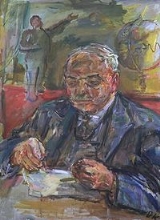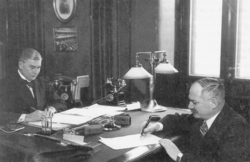
Ivan Maysky
Encyclopedia

Moscow
Moscow is the capital, the most populous city, and the most populous federal subject of Russia. The city is a major political, economic, cultural, scientific, religious, financial, educational, and transportation centre of Russia and the continent...
) was a Soviet
Soviet Union
The Soviet Union , officially the Union of Soviet Socialist Republics , was a constitutionally socialist state that existed in Eurasia between 1922 and 1991....
diplomat, historian, and politician, notable as that country's ambassador
Ambassador
An ambassador is the highest ranking diplomat who represents a nation and is usually accredited to a foreign sovereign or government, or to an international organization....
to London
London
London is the capital city of :England and the :United Kingdom, the largest metropolitan area in the United Kingdom, and the largest urban zone in the European Union by most measures. Located on the River Thames, London has been a major settlement for two millennia, its history going back to its...
during much of World War II
World War II
World War II, or the Second World War , was a global conflict lasting from 1939 to 1945, involving most of the world's nations—including all of the great powers—eventually forming two opposing military alliances: the Allies and the Axis...
. He is represented on one of the iconic portraits of the 20th century (illustrated, to the right).
Ivan Maisky was born Jan Lachowiecki to a Russified
Russification
Russification is an adoption of the Russian language or some other Russian attributes by non-Russian communities...
Polish family
Poles
thumb|right|180px|The state flag of [[Poland]] as used by Polish government and diplomatic authoritiesThe Polish people, or Poles , are a nation indigenous to Poland. They are united by the Polish language, which belongs to the historical Lechitic subgroup of West Slavic languages of Central Europe...
living in Imperial Russia. Shortly after graduating from the historical faculty of the Moscow University, in 1903 he joined the Russian Social Democratic Labour Party
Russian Social Democratic Labour Party
The Russian Social Democratic Labour Party , also known as Russian Social Democratic Workers' Party or Russian Social Democratic Party, was a revolutionary socialist Russian political party formed in 1898 in Minsk to unite the various revolutionary organizations into one party...
and then the Menshevik faction. In 1908 he left Russia for western Europe, where he learned English and French. At the outbreak of the Russian Civil War
Russian Civil War
The Russian Civil War was a multi-party war that occurred within the former Russian Empire after the Russian provisional government collapsed to the Soviets, under the domination of the Bolshevik party. Soviet forces first assumed power in Petrograd The Russian Civil War (1917–1923) was a...
and the revolt of the Czechoslovak Legion
Czechoslovak Legions
The Czechoslovak Legions were volunteer armed forces composed predominantly of Czechs and Slovaks fighting together with the Entente powers during World War I...
in Siberia
Siberia
Siberia is an extensive region constituting almost all of Northern Asia. Comprising the central and eastern portion of the Russian Federation, it was part of the Soviet Union from its beginning, as its predecessor states, the Tsardom of Russia and the Russian Empire, conquered it during the 16th...
, Maisky returned to Russia and settled in Samara
Samara, Russia
Samara , is the sixth largest city in Russia. It is situated in the southeastern part of European Russia at the confluence of the Volga and Samara Rivers. Samara is the administrative center of Samara Oblast. Population: . The metropolitan area of Samara-Tolyatti-Syzran within Samara Oblast...
, where he joined the local Komuch government, for which he was banished by the Mensheviks.
In 1921, he officially joined the All-Russian Communist Party (Bolsheviks)
Bolshevik
The Bolsheviks, originally also Bolshevists , derived from bol'shinstvo, "majority") were a faction of the Marxist Russian Social Democratic Labour Party which split apart from the Menshevik faction at the Second Party Congress in 1903....
which started his career within the communist system of power in Russia. In 1922 he started working as a diplomat at various posts. In 1924, he became the first editor of the Petrograd literary magazine Zvezda
Zvezda (magazine)
Zvezda is a Russian literary magazine published in Saint Petersburg since 1924. It began as a bimonthly, but has been monthly since 1927.- History :The first issue of Zvezda appeared in January 1924, with Ivan Maisky as editor-in-chief...
. In 1929, he became the Soviet ambassador to Finland
Finland
Finland , officially the Republic of Finland, is a Nordic country situated in the Fennoscandian region of Northern Europe. It is bordered by Sweden in the west, Norway in the north and Russia in the east, while Estonia lies to its south across the Gulf of Finland.Around 5.4 million people reside...
. In 1932 he became the envoy to the United Kingdom
United Kingdom
The United Kingdom of Great Britain and Northern IrelandIn the United Kingdom and Dependencies, other languages have been officially recognised as legitimate autochthonous languages under the European Charter for Regional or Minority Languages...
, a post he held until 1943. A close collaborator of Maxim Litvinov
Maxim Litvinov
Maxim Maximovich Litvinov was a Russian revolutionary and prominent Soviet diplomat.- Early life and first exile :...
, Maisky was an active member and the Soviet envoy to the Committee of Non-Intervention during the Spanish Civil War
Spanish Civil War
The Spanish Civil WarAlso known as The Crusade among Nationalists, the Fourth Carlist War among Carlists, and The Rebellion or Uprising among Republicans. was a major conflict fought in Spain from 17 July 1936 to 1 April 1939...
.
After the outbreak of World War II
World War II
World War II, or the Second World War , was a global conflict lasting from 1939 to 1945, involving most of the world's nations—including all of the great powers—eventually forming two opposing military alliances: the Allies and the Axis...
and the Soviet break-up with their former allies, Maisky was responsible for the normalization of relations with the Western Allies
Western Allies
The Western Allies were a political and geographic grouping among the Allied Powers of the Second World War. It generally includes the United Kingdom and British Commonwealth, the United States, France and various other European and Latin American countries, but excludes China, the Soviet Union,...
. Among other pacts, he signed the Sikorski-Mayski Agreement
Sikorski-Mayski Agreement
The Sikorski–Mayski Agreement was a treaty between the Soviet Union and Poland signed in London on 30 July 1941. Its name was coined after the two most notable signatories: Polish Prime Minister Władysław Sikorski and Soviet Ambassador to the United Kingdom Ivan Mayski.- Details :After signing...
of 1941, which declared the Nazi-Soviet Pact null and void. It also normalized relations between the Soviet Union and the Polish government-in-exile and allowed for hundreds of thousands of Poles to be released from the Soviet Gulag
Gulag
The Gulag was the government agency that administered the main Soviet forced labor camp systems. While the camps housed a wide range of convicts, from petty criminals to political prisoners, large numbers were convicted by simplified procedures, such as NKVD troikas and other instruments of...
. In 1943, he was called off to Moscow
Moscow
Moscow is the capital, the most populous city, and the most populous federal subject of Russia. The city is a major political, economic, cultural, scientific, religious, financial, educational, and transportation centre of Russia and the continent...
, where he became the deputy commissar of foreign affairs. In this capacity, he was a member of Soviet delegations to the conferences in Yalta
Yalta Conference
The Yalta Conference, sometimes called the Crimea Conference and codenamed the Argonaut Conference, held February 4–11, 1945, was the wartime meeting of the heads of government of the United States, the United Kingdom, and the Soviet Union, represented by President Franklin D...
and Potsdam
Potsdam Conference
The Potsdam Conference was held at Cecilienhof, the home of Crown Prince Wilhelm Hohenzollern, in Potsdam, occupied Germany, from 16 July to 2 August 1945. Participants were the Soviet Union, the United Kingdom, and the United States...
.
In 1945, he retired from active service in Soviet diplomacy and devoted himself to history. From 1946 onwards he was a member of the Soviet Academy of Sciences
Russian Academy of Sciences
The Russian Academy of Sciences consists of the national academy of Russia and a network of scientific research institutes from across the Russian Federation as well as auxiliary scientific and social units like libraries, publishers and hospitals....
. In 1953, shortly before Stalin
Joseph Stalin
Joseph Vissarionovich Stalin was the Premier of the Soviet Union from 6 May 1941 to 5 March 1953. He was among the Bolshevik revolutionaries who brought about the October Revolution and had held the position of first General Secretary of the Communist Party of the Soviet Union's Central Committee...
's death, he was arrested and sentenced to six years in prison for alleged espionage. In 1955, however, he was released, cleared of all charges and fully rehabilitated
Rehabilitation (Soviet)
Rehabilitation in the context of the former Soviet Union, and the Post-Soviet states, was the restoration of a person who was criminally prosecuted without due basis, to the state of acquittal...
. In 1966 Maisky signed the so-called Letter of 25 Soviet writers, scientists and cultural figures, addressed to Leonid Brezhnev and expressing opposition to a possible rehabilitation of Stalin.

